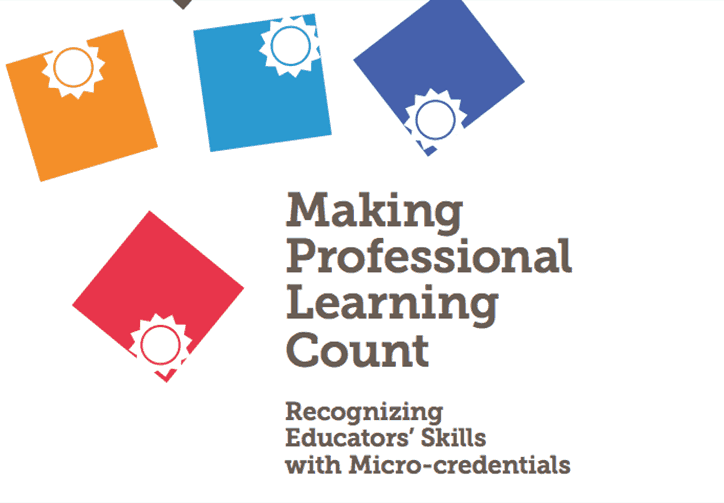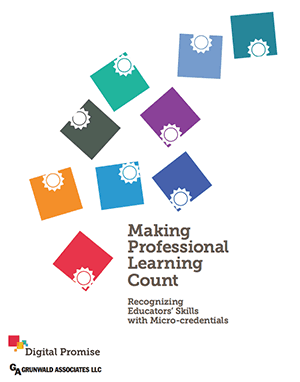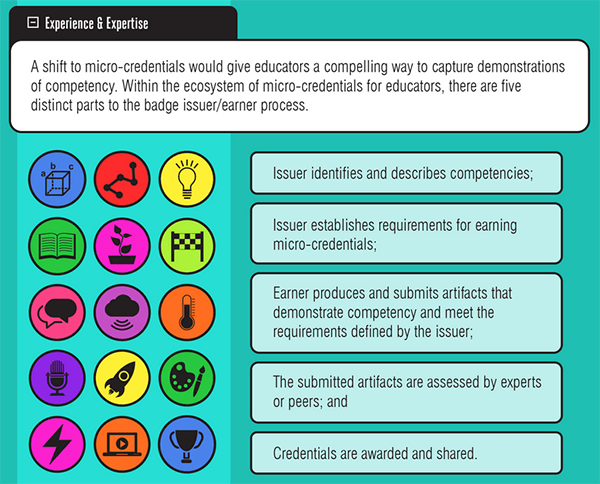Micro-credentials for Personalized, Powerful Professional Learning

In 2014 Getting Smart invited Digital Promise’s Karen Cator to join our exploration of the future of teacher preparation and professional development. The result was Preparing Teachers For Deeper Learning – a guide that outlines how the role of teachers is changing amid broader shifts to personalized, blended, and deeper learning. In it we outline a vision for personalized professional learning that offers:
- Balance between teacher-defined goals, goals as defined by administration through teacher evaluation efforts, and school and district educational goals;
- Some element of teacher control over time, place, path and/or pace;
- Job-embedded and meaningful integration into classroom practice; and
- Competency-based progression.
The guide describes how micro-credentials could serve as a key component of this system. To earn a micro-credential (sometimes referred to as a digital badge), teachers could select the specific competencies they wish to develop, submit evidence of their competence, and receive recognition through digital badges.
A new report from Digital Promise further explores the potential of microcredentials for educators. Together with Grunwald Associates, Digital Promise released Making Professional Learning Count: Recognizing Educators’ Skills with Micro-credentials — a report that shares the results of a survey of teachers on their views on professional development and microcredentials.
“ Teachers earn credentials at the beginning of their careers, but they learn new skills every day,” said Karen Cator, President and CEO of Digital Promise. “Yet this lifelong commitment to learning is rarely formally recognized. What teachers learn once they are in the classroom does not appear on their resume or in their employment 2 records, and there are limited pathways for them to receive recognition for their professional learning and growth, or to share learning with their peers. Over time, a system of micro-credentials has the potential to transform professional learning and strengthen professional practice.”
Teachers earn credentials at the beginning of their careers, but they learn new skills every day,” said Karen Cator, President and CEO of Digital Promise. “Yet this lifelong commitment to learning is rarely formally recognized. What teachers learn once they are in the classroom does not appear on their resume or in their employment 2 records, and there are limited pathways for them to receive recognition for their professional learning and growth, or to share learning with their peers. Over time, a system of micro-credentials has the potential to transform professional learning and strengthen professional practice.”
The results confirm that teachers see micro-credentials as a way to power more personalized, professional learning. However, not many teachers are familiar with them.
- Nearly two-thirds (65 percent) of U.S. K-12 teachers say they’re likely to try micro-credentials as part of their ongoing professional development.
- Despite high interest in micro-credentials, when presented with a description of them, just 15 percent of teachers surveyed considered themselves even “somewhat” familiar with micro-credentials.
- According to teachers, some of the most appealing aspects of micro-credentials are opportunities to learn new skills or hone existing ones.
For more information, download the full report, check out Digital Promise’s blog about the findings or explore their Micro-credentials resource page.
For more on personalized professional learning, check out:





0 Comments
Leave a Comment
Your email address will not be published. All fields are required.